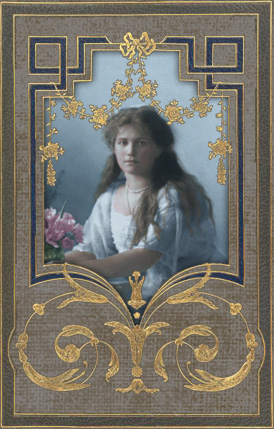A website we developed won this prestigious award.







CHAPTER 22
THE OUTBREAK OF WAR
WE returned to St. Petersburg towards the end of January, and the Court season began. This year it was destined to be broken off by the sudden outbreak of war in the East.
As usual about six large balls had been arranged for, and some theatrical entertainments, but it was all over in a very short time.
In the nurseries we had a few children's parties, but nothing very much. Little Anastasie was delighted with the stir and bustle of city life and deeply interested in all she saw. The children developed a love for those little toy balloons which are sold in the streets. When they were very good I used to send out and get them one each. But Anastasie used sometimes to want me to stop the carriage and buy them from the men, and this, of course, could not be allowed. So I always said simply that I could not, without advancing any reason. She evidently thought force would have to be used to induce him to part with them, for one day she saw some little children walking on the Palace Quay, each one with a balloon. She drew my attention to them. "Look, look!" cried she; "little children with balloons; get out, take them from them and give them to me." I explained why that would not do, so she said, "Well, get out, and ask them nicely and politely, and perhaps they will give them to me."
After the war broke out the children, even little Anastasie, worked at frame knitting. They made scarves for the soldiers, and Olga and Tatiana crocheted caps indefatigably. The Empress started working parties, and had more than five thousand ladies working for her.
Some of the work done was very peculiar: one girl sewed the sleeves of a shirt she was given to make, into the collar band; another had a pair of surgical trousers to make, and gathering them along the top, put them into a twenty-inch waist-band. It was very funny, but at the same time I doubt whether the same class of girls in any other country would have done better, for all these people belonged to the Court circles.
A band of girls came to the Empress and petitioned her to send them out to the war to nurse the wounded. Their request was refused, but the Empress said to them, "If you really wish to help you can go into the hospitals in St. Petersburg and work there, leaving the trained nurses free to go to the front." Without exceptions they all went and did what she suggested, and most of them stuck to it also. One girl, the belle of St. Petersburg, aged nineteen, got on so well that she was soon placed in charge of a ward for night-work.
One evening on coming to the hospital she found a young woman of the peasant class in charge of her work. She went to see the matron, who said, "I had a vacancy which I intended for my niece. You took it, but as you are only taking up nursing for a pastime, I sent for my niece and put her there, for she will take it up as a profession. You can do anything you like, but my niece stays there."
The girl was vexed at such treatment, so she walked away. She had only got to the foot of the stairs when she thought of the motive which led her into the hospital at first, and saying to herself, "My love for my country is a very poor thing if I cannot stand a little snub," she returned, and worked all night under the direction of this ignorant peasant woman, who had usurped her place.
When the doctors found it out, they placed the society girl in another and superior place, where she acquitted herself with honour.
It was very sad to me to witness the wrathful vindictive spirit that the war raised in my little charges. One of the illustrated papers had a picture of the baby children of the Crown Prince of Japan. Marie and Anastasie came running across to see the picture, and wanted to know who those queer little children were. I told them, and with a look of hatred coming into her sweet little face Marie slapped the picture with her open hand. "Horrid little people," said she; "they came and destroyed our poor ships and drowned our sailors." I explained to her that it was not these little children, who were only babies younger than Anastasie. So she said, "Yes; those little babies did it. Mama told me the Japs were all only little people."
Olga was working very diligently one day and said to me, "I hope the Russian soldiers will kill all the Japanese; not leave even one alive."
I told her there were many little children and women in Japan, people who could not fight, and asked her if she really thought it would be good of the Russian soldiers to kill them. She reflected for a moment, and then asked, "Have they an Emperor in Japan?" I answered, "Certainly." She asked various other questions which I answered; then she said slowly, "I did not know that the Japs were people like ourselves. I thought they were only like monkeys." She never said again anything about being pleased to hear of the deaths of the Japanese.
Someone in speaking to me of the four little girls lately said to me, "Olga has grace, wit, and good looks; Tatiana is a regular beauty; Marie is so sweet-natured, good and obliging, no one could help loving her; but little Anastasie has personal charm beyond any child I ever saw."
It was a good, and so far as it went, a true summary of the children as they would appear to a stranger, but there is a great deal more depth and strength of character in all the children than appears at first sight. I often wonder what use they will make of all the talents God has entrusted them with, and feel assured that as the apple never falls very far from the tree, so with such good parents my dear little charges will never go astray.



